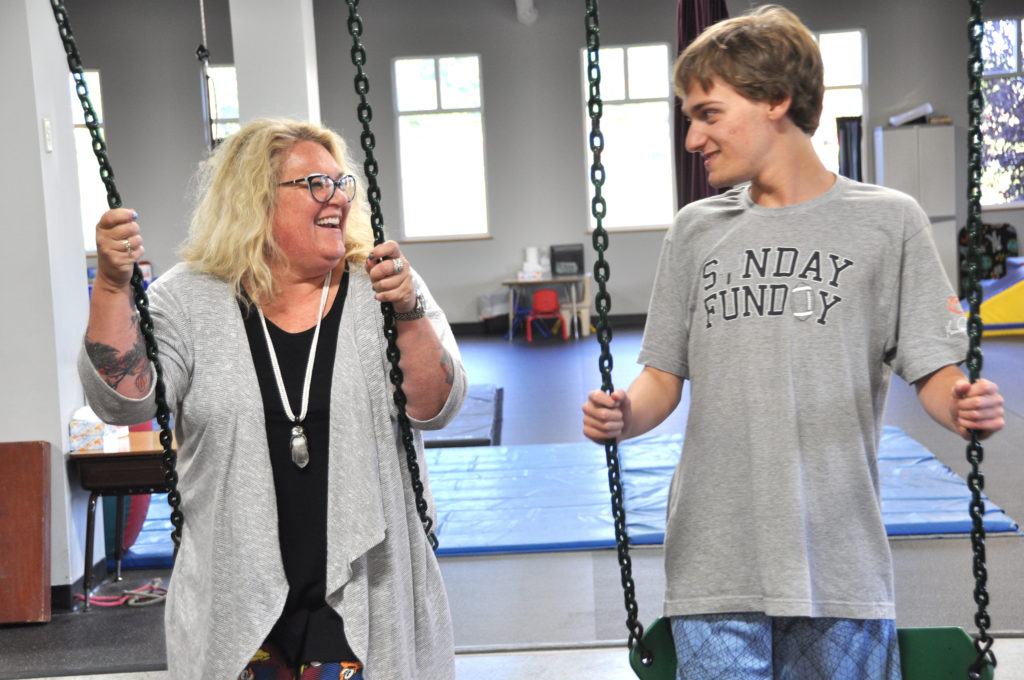Setting Goals and Managing Expectations by Jenn Jordan, Q102 Radio Host
 At Jakob’s first IEP meeting when he was three, his teacher asked me what goals I had for him. I had no clue. I mean I knew I wanted him to be better. To be happier. To act more like other kids his age, you know, the “normal” ones. Seeing the end results I wanted was easy. Creating a plan for how to get there was not. In that initial meeting while I sat in a chair made for a toddler, the only goal I could come up with was “drink out of a cup.”
At Jakob’s first IEP meeting when he was three, his teacher asked me what goals I had for him. I had no clue. I mean I knew I wanted him to be better. To be happier. To act more like other kids his age, you know, the “normal” ones. Seeing the end results I wanted was easy. Creating a plan for how to get there was not. In that initial meeting while I sat in a chair made for a toddler, the only goal I could come up with was “drink out of a cup.”
After fourteen years of practice and lots of work to understand, it’s easier. I can look at Jakob and see where he is and where I’d love to see him go next. A lot of the time, I even know what we can do to help get him there. Back then the process was frustrating and scary, now it’s exciting and fun.
The biggest struggle for me in the beginning was coming to the realization that accepting where he was didn’t mean that I believed he wasn’t capable of doing or being more. Acceptance doesn’t mean losing faith or giving up hope. It means seeing without judgment what is right in front of me. And the only way to make a plan for where I wanted us to go was to really understand where we were. Once I got a good handle on that, we were ready to proceed.
The other big shift in my thinking had to do with expectations and attaching to outcomes. After learning to accept that Jakob was right where he was with communication and eye contact and flexibility and behaviors, I also had to accept that nothing may ever change. Where he was in each of those moments that he didn’t seem to notice I was in the same room or when he would scream and cry for reasons that weren’t apparent to me, may be exactly where he was going to stay forever. I had no way of knowing. Just because I wanted him to learn new things and that there would be a whole team of people trying to teach him those things didn’t mean he was going to learn them. I remained hopeful, with no expectations. And if I was to do all of that with an open and loving heart, I had to be ok if nothing did change. I had to do all of the goal setting and planning and teaching with no attachment to the outcome. If he learned something new, great! If nothing changed, great! Either way, I would continue to love and not judge and accept. And I would keep trying.
I think it’s really easy to get all caught up in the “should-be” thinking with our special kids. So much so that we miss the possible what-may-be’s. He should be looking in my eyes (maybe it’s hard for him to listen to what I’m saying if he has to look at me too). He should be eating more vegetables (maybe they’re hurting his stomach and he just can’t tell me). He should be riding a bicycle (maybe his whole world spins when his feet leave the ground and he gets terrible vertigo). When we put “should-be” pressure on ourselves and them, we all suffer.
Accept where your child is. Don’t judge them (or you) if they don’t change. And love love love them no matter what. If you’re able to do that, it’s easy to set goals and you’ll have so much fun helping them reach them. Or not reach them. Either way, you’re living a life filled with unconditional love.
 Skip to content
Skip to content